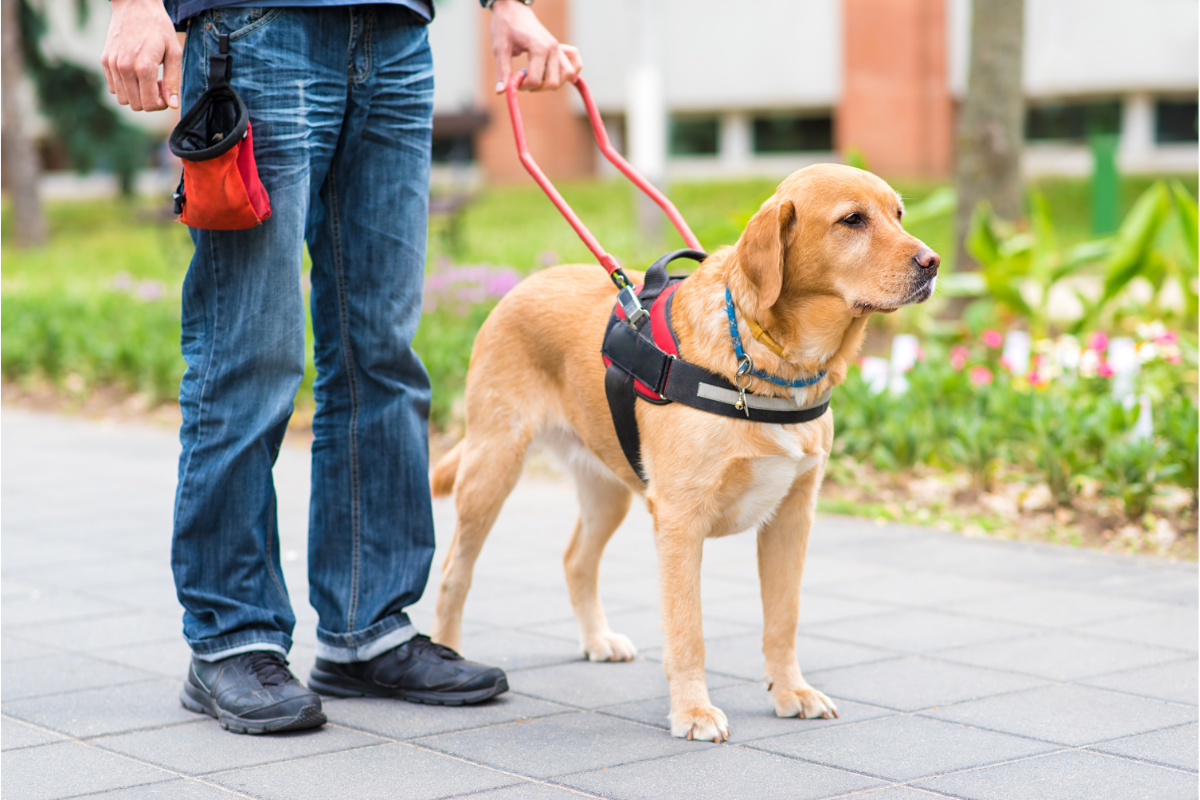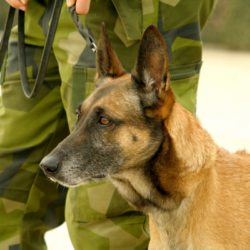Post-traumatic stress disorder (PTSD) is a psychological disorder often observed in military personnel exposed to combat situations and high-risk environments. The disorder manifests itself through symptoms such as flashbacks, hypervigilance, sleep disturbances and difficulties in managing day-to-day stress. These symptoms can have a considerable impact on the quality of life and social and professional functioning of those affected. In this context, the use of assistance dogs appears to be a promising therapeutic approach. These specially trained animals can provide emotional support and help to alleviate some of the symptoms of PTSD.
What is PTSD?
Post-traumatic stress disorder(PTSD) is a psychological condition that occurs after an event that is perceived as traumatic and overwhelming, such as an assault, natural disaster, serious accident or military combat. It affects around 9% of the population at some point in their lives and manifests itself as disruptive symptoms that have a significant impact on the social, professional and family life of the individuals concerned.
People with PTSD often experience frequent reliving of the traumatic event in the form of flashbacks, nightmares or uncontrollable intrusive thoughts. This intrusion causes intense emotional stress and may be triggered by stimuli associated with the initial event, such as similar sounds or images.
Patients also often adopt avoidance behaviours, actively avoiding places, situations or even discussions that remind them of the trauma. This avoidance limits their ability to cope with the effects of the trauma, which can increase their anxiety.
PTSD also affects mood and cognition. People may feel guilty for having survived, become emotionally numb or feel disconnected from their loved ones. Problems with alertness, such as hypervigilance to threats and difficulty concentrating, often complete the symptom picture.
Treatments for PTSD rely mainly on psychotherapy, including trauma-focused cognitive behavioural therapy and EMDR (eye movement desensitisation and reprocessing). In some cases, antidepressants may be prescribed to alleviate certain symptoms. Appropriate and sustained care is essential, as PTSD can become chronic and cause lasting disability if not treated effectively.
What is a post-traumatic stress service dog?
A PTSD service dog accompanies people with post-traumatic stress disorder in their daily lives to help alleviate the effects of this condition. As a constant partner, the dog provides emotional support, security and independence, helping its recipient to regain confidence and reintegrate into society.
The assistance dog’s career begins with a rigorous selection process, favouring animals with a calm temperament, curious and able to react positively to unexpected situations. After selection, the dog undergoes basic socialisation to get used to different environments, sounds and smells. This stage prepares the dog to be at ease in public places and to develop solid obedience. Once advanced socialisation has been achieved, the dog learns specific tasks to support the needs of its future partner with PTSD.
These tasks include targeted actions to manage the symptoms of PTSD: waking the owner in the event of a nightmare, bringing the person back to the present in the event of dissociation, or searching the home to calm hypervigilance. In situations of panic or anxiety, the dog can act as a protective barrier against strangers, create a safe space in crowds, or guide its owner towards an exit. It can also retrieve medication from an alarm, activate an emergency button or even distract a person to calm them down.
Once the dog has completed its training, it receives official certification, enabling it to legally accompany its owner in public places. On a day-to-day basis, the PTSD service dog contributes to a reduction in isolation, a feeling of accomplishment and the general well-being of its partner, playing an essential role in their recovery and independence.
What benefits do dogs bring to victims of PTSD?
A PTSD service dog offers invaluable support to people affected by post-traumatic stress disorder by reducing their symptoms and improving their quality of life. Thanks to their olfactory detection capacity, some dogs can identify stress signals even before the physical manifestations occur, making it possible to intervene at an early stage to soothe their owner.
PTSD assistance dogs perform specific tasks that provide comfort and emotional anchoring. For example, they wake up their owner in the event of nightmares, bring the person back to reality during dissociative phases by resting their muzzle or nudging them, and detect anxiety attacks to offer immediate comfort. They can also retrieve medication if necessary, turn on lights to dispel night terrors, or inspect the home to reduce hypervigilance.
These actions significantly improve the person’s independence and safety, while reducing social isolation. Several studies show that people with a PTSD service dog experience a reduction in nightmares, sleep disorders,anxiety and anger. Veterans in particular benefit from a reduction in overall symptoms, increased well-being, greater resilience and easier social reintegration. In addition to the emotional benefits, assistance dogs often reduce the need for anxiolytic or hypnotic medication, lightening the load for family carers.
The benefits of a service dog for PTSD go beyond practical assistance: they increase the sense of purpose and life satisfaction and provide an essential emotional bond. By providing a calm, stable presence, the dog helps its partner to break the isolation and reconnect with society, while reducing the burden on family carers.





